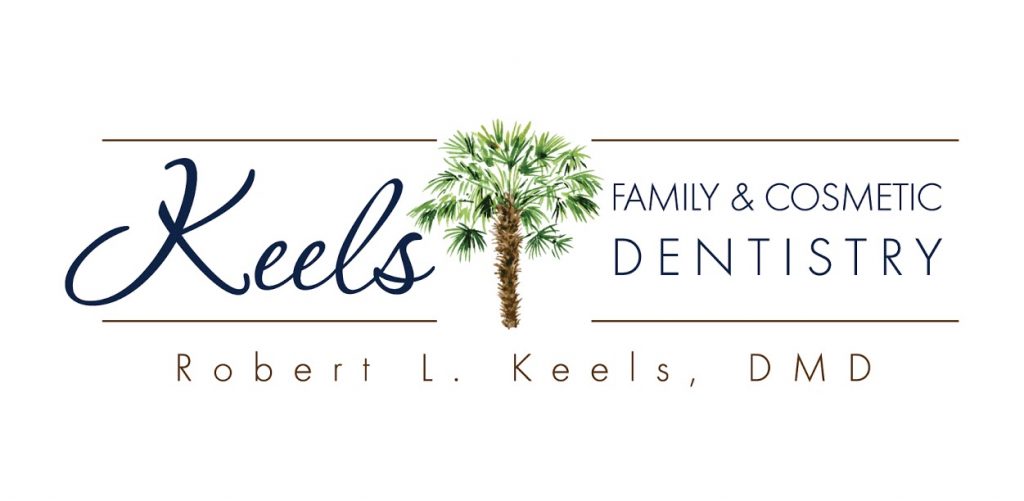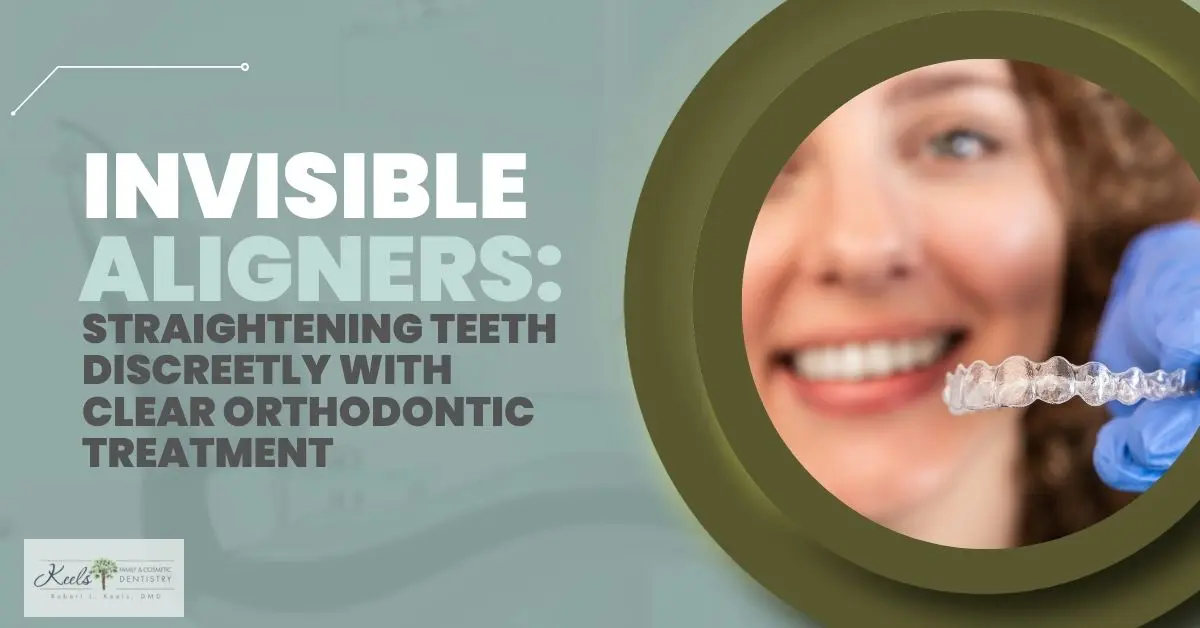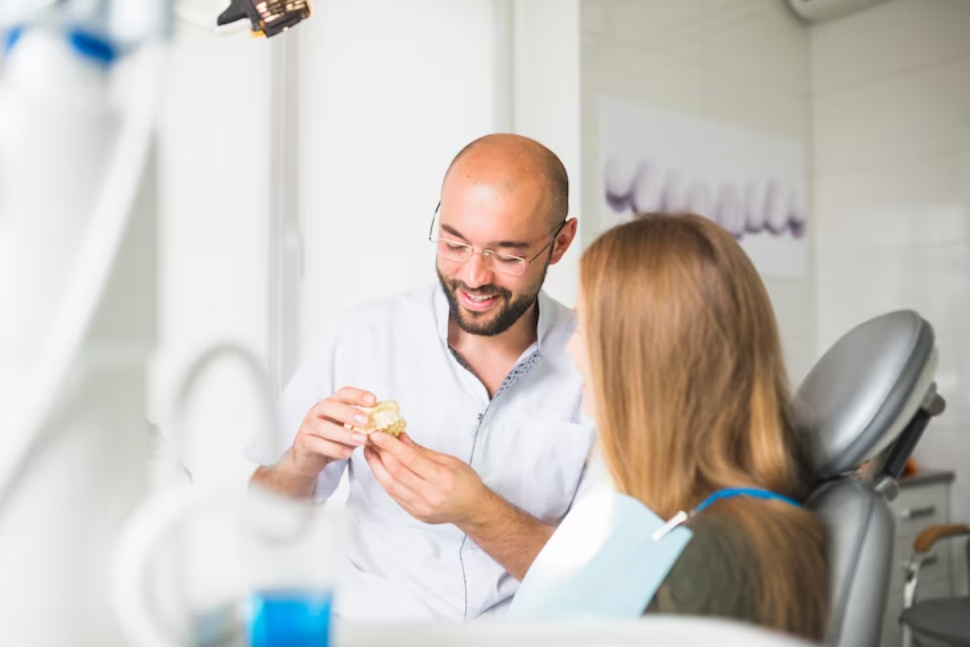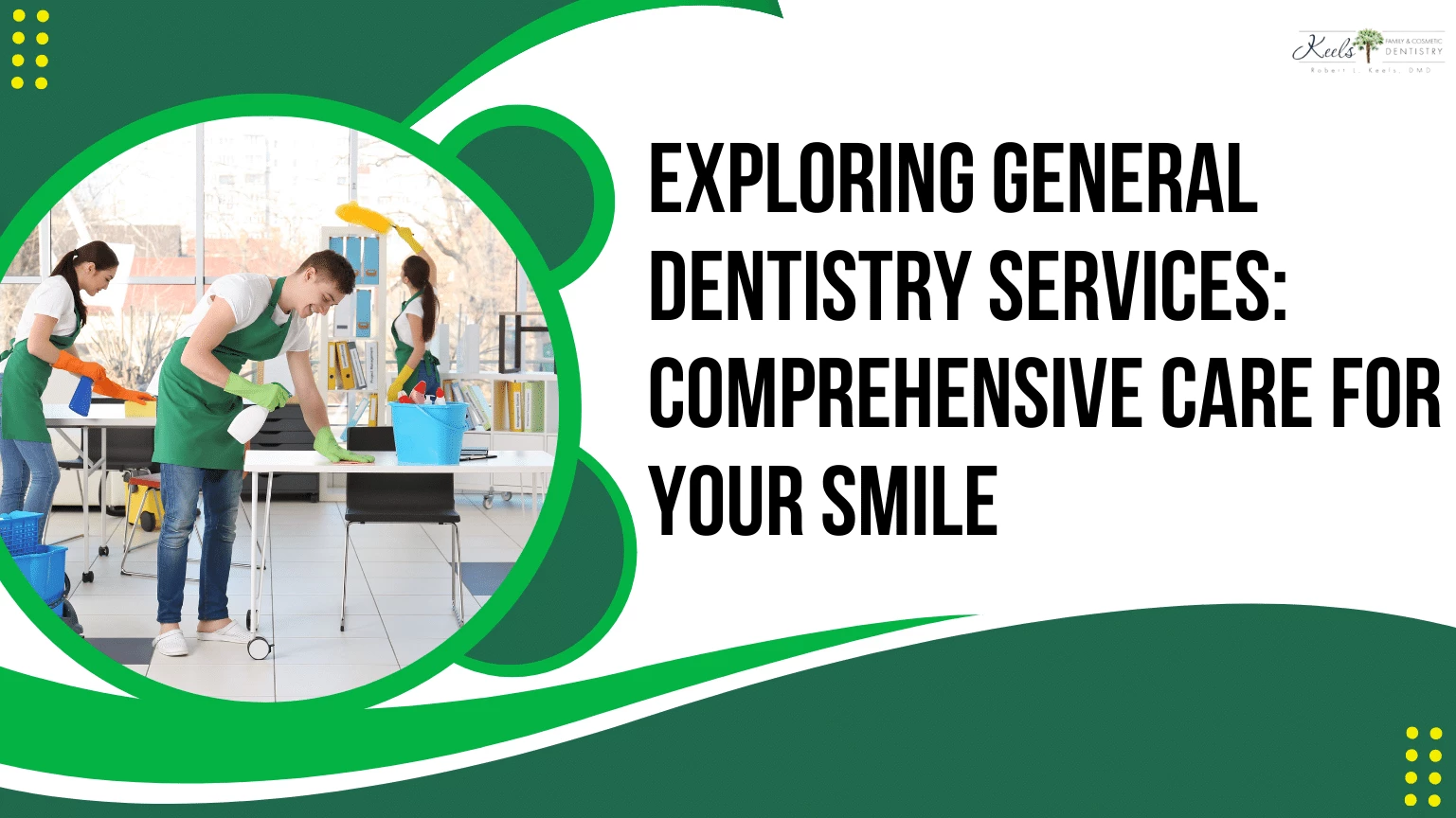SCHEDULE AN APPOINTMENT!
Getting your teeth checked regularly is super important for keeping your mouth in tip-top shape. At Keels Family & Cosmetic Dentistry, we understand the importance of regular dental exams in preventing dental issues and ensuring a healthy smile.
Our experienced dentists thoroughly examine your teeth, gums, and oral health during a dental examination. We will check for any evident signs or symptoms of tooth decay, gum disease, or other oral health problems. This includes assessing the condition of your teeth and gums, checking for cavities or cracks in the teeth, and evaluating the alignment of your bite.
Our dentists may also perform X-rays to examine your teeth and gums for a comprehensive view of your oral health. This allows them to detect any underlying issues that may not be visible during a visual examination.
A dental exam goes beyond just identifying problems. Our caring team takes the time to educate patients about proper oral hygiene practices and provides personalized recommendations for maintaining optimal oral health.
Stay on top of your dental health with regular exams. Catching problems early means less pain, less hassle, and less money out of your pocket. Don’t let dental issues sneak up on you – schedule your check-up today!
What to Expect for My New Patient Appointment
We totally get it – going to a new dentist can be pretty intimidating. But don’t worry, we’re here to make your visit as easy and stress-free as possible! However, our team is committed to providing exceptional care and making your first appointment as comfortable as possible. This section will walk you through what to expect during your new patient appointment and the importance of a dental exam.
Going to your first appointment with a new doctor can be a mix of excitement and nerves, but don’t worry! Knowing what to expect can help you feel more relaxed and at ease.
Here are some general things you can expect during your new patient appointment:
Registration and paperwork: When you arrive at the healthcare facility, you’ll likely be asked to fill out some paperwork. This may include personal information, medical history, insurance details, and consent forms. To save time, you can inquire in advance if you can download and fill out the forms online before your visit.
Check-in process: You’ll need to check-in at the front desk or with the receptionist. They will guide you through the registration process and may collect your completed paperwork if you haven’t submitted it already.
Medical history review: Your dentist will review your medical history. This helps them understand your previous health conditions, medications, allergies, surgeries, and family medical history. Providing accurate and comprehensive information is crucial for your doctor to make informed decisions about your health.
Physical examination: When you go to the doctor, they might want to give you a physical check-up depending on why you’re there. The examination will include checking your heart rate, blood pressure, and temperature. Plus, the dentist may conduct other examinations relevant to your health concern.
Discussion of health concerns: Be prepared to discuss any specific health issues, symptoms, or concerns you have. Open communication with your healthcare provider is essential for an accurate diagnosis and treatment plan.
Questions and answers: Your doctor may ask you questions about your lifestyle, habits, diet, and exercise routine to get a complete picture of your overall health. Feel free to ask any questions you may have about your health, treatment options, or any uncertainties you want to address.
Diagnostic tests: If necessary, your healthcare provider may recommend certain diagnostic tests, such as blood work, X-rays, MRI, or other screenings. These tests help to gather additional information to aid in diagnosis.
Treatment plan: Based on the examination and discussion, your healthcare provider will develop a treatment plan tailored to your specific needs. This plan may include lifestyle recommendations, medications, therapies, or further diagnostic tests.
Follow-up appointments: If your condition requires ongoing management, your healthcare provider may schedule follow-up appointments to monitor your progress and adjust the treatment plan if necessary.
Patient education: Your healthcare provider may offer you some educational materials or resources related to your health condition or general wellness.
Your new patient appointment at Keels Family & Cosmetic Dentistry is designed to ensure a thorough evaluation of your oral health. Our dedicated team of professionals will guide you through the process, addressing any concerns or questions. We are committed to providing you with exceptional care and helping you achieve optimal oral health.
Schedule your appointment today and experience the difference at Keels Family & Cosmetic Dentistry!
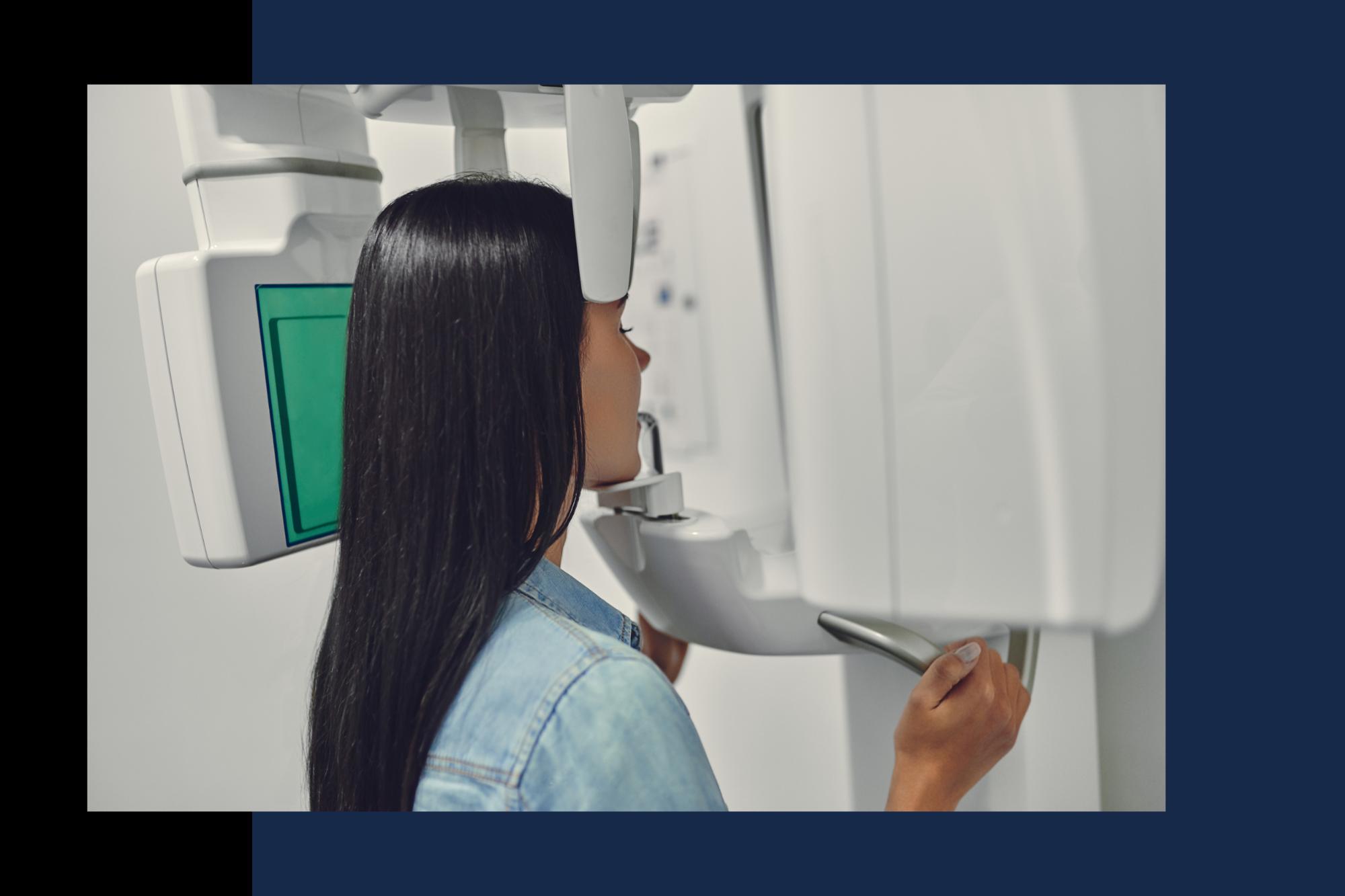
Oral Cancer Screening
Oral cancer screening is a process that involves the examination of the oral cavity and surrounding areas to detect any signs of oral cancer or precancerous lesions. The purpose of oral cancer screening is to identify potential issues at an early stage when they are more treatable.
Here are some key aspects of oral cancer screening:
- Risk Factors: Certain factors can increase the risk of developing oral cancer. These may include tobacco use (smoking or chewing), excessive alcohol consumption, human papillomavirus (HPV) infection, a history of oral cancer or other head and neck cancers, and prolonged sun exposure (for lip cancer).
- Visual Examination: During a routine dental or medical checkup, a healthcare professional will examine your mouth, lips, tongue, gums, and the inside of your cheeks for any abnormal growths, sores, or changes in color or texture.
- Physical Examination: The healthcare provider may also feel the tissues in your mouth and neck to check for any lumps or enlarged lymph nodes that could indicate a problem.
- Oral Cancer Screening Devices: Some dental offices use additional tools or technologies for screening, such as special lights or dyes that help detect abnormal cells in the mouth.
- Biopsy: If any suspicious areas are identified during the screening process, a biopsy may be performed. During a biopsy, a small sample of the tissue is taken and sent to a laboratory for examination to determine if cancer cells are present.
- Frequency: The frequency of oral cancer screening may vary based on individual risk factors. Generally, regular dental checkups (every six months) may include a basic oral cancer screening.
- Self-Examination: It is also recommended to be aware of any changes in your mouth between dental visits. Performing a regular self-examination can help you identify any unusual growths or sores that may require further evaluation by a healthcare professional.
It’s important to note that oral cancer can develop without any noticeable symptoms in its early stages, which is why regular screenings are essential for early detection and timely intervention.
At Keels Family & Cosmetic Dentistry, our experienced dental professionals are trained to perform thorough oral cancer screenings during routine dental check-ups. The process is quick, painless, and non-invasive. Our dentists can detect potential signs of oral cancer by visually examining the mouth for any abnormalities or suspicious lesions.
Our dentists will carefully inspect your mouth for red or white patches on the gums or other soft tissues during an oral screening appointment. They will also examine your tongue and throat for any lumps or irregularities. To prove a diagnosis, sometimes more diagnostic tests, like biopsies, are needed.
Early detection is key when it comes to successfully treating oral cancer. By identifying potential warning signs during routine screenings, we can refer patients for further evaluation and treatment if necessary. This proactive approach significantly increases the chances of successful outcomes while minimizing the need for extensive interventions.
It’s important to note that everyone is at risk of developing oral cancer, regardless of age or lifestyle habits. While certain factors, such as tobacco use and excessive alcohol consumption, can increase the risk, individuals who do not engage in these behaviors should still undergo regular screenings.
Schedule your next dental check-up with us and experience the peace of mind of knowing you’re in good hands. Contact us for more information!
Why Choose Keels Family & Cosmetic Dentistry?
Make An Appointment
At Keels Family & Cosmetic Dentistry, we understand that people choose our practice for a multitude of reasons. Our prime location offers convenience to our valued patients, making it easy to schedule appointments and prioritize their oral health. The trust and satisfaction of our patients, who often refer friends and family, have solidified our reputation as a professional and caring dental office within our community. Our comprehensive services range from cosmetic dentistry to dental care for the entire family, ensuring that we meet the unique needs of every member. We work with various dental insurance plans to make quality care accessible. With flexible scheduling, a warm and welcoming atmosphere, state-of-the-art technology, and a commitment to patient education, we aim to provide not just dental services but also a comfortable and personalized experience. At Keels Family & Cosmetic Dentistry, we prioritize the health and well-being of our patients above all else, fostering a strong personal connection with each individual who walks through our doors.
